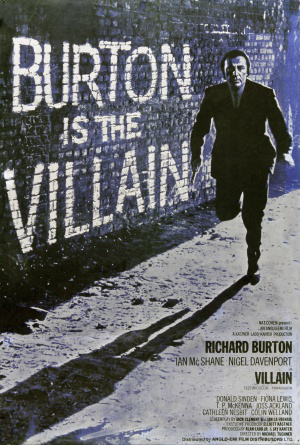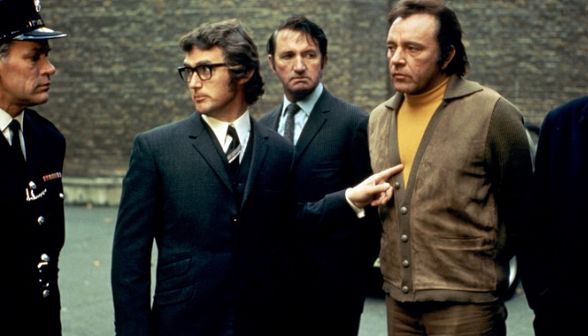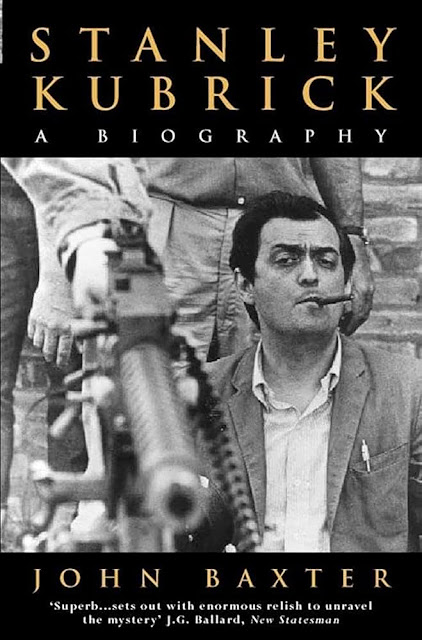Villain (1971)
Genre Crime Thriller
Country UK
Director Michael Tuchner
Screenplay Dick Clement, Ian La Frenais, adaptation by Al Lettieri, based on the novel Burden of Proof by James Barlow
Country UK
Director Michael Tuchner
Screenplay Dick Clement, Ian La Frenais, adaptation by Al Lettieri, based on the novel Burden of Proof by James Barlow
Starring Richard Burton, Ian McShane, Nigel Davenport, Donald Sinden, T.P. McKenna, Joss Ackland, Fiona Lewis, Cathleen Nesbitt, Elizabeth Knight, Colin Welland
Running time 98 mins Colour Technicolor Widescreen Panavision
Villain is a tough British gangster film from the 1970s, starring Richard Burton as East End gang boss Vic Dakin.
Dakin is a doting son, who loves his dear old mother, brings her tea and tucks her up in bed every night. They live together in their cosy suburban house, and he takes her to Brighton every week for a day trip to the seaside. But Vic Dakin has another side. He is also one of London's most notorious criminals, a vicious sadist who will bribe, blackmail and maim those who cross or threaten him.
The police are on Dakin's trail, led by Inspector Matthews (Nigel Davenport), who is looking for a way to bring him in. But Dakin seems untouchable, and in his world almost anyone can be bought. He even has a Member of Parliament, Gerald Draycott (Donald Sinden), in his pocket, who can support him and provide an unquestioned alibi if necessary. And he has his errant lover, Wolfe (Ian McShane), a small time hustler who supplies women, and occasionally men, for country house orgies to provide material for Dakin's blackmail efforts.
Things start to go wrong for Dakin when he masterminds a wages snatch. The job is on the territory of his rival, Frank Fletcher (T.P. McKenna), so Dakin involves Fletcher and his brother-in-law Edgar (Joss Ackland) in the job. But when the money goes missing and Edgar is arrested, Inspector Matthews sees an opportunity to set a trap for Dakin.
Villain is an oddly neglected and underrated British crime film of the early 1970s. Released the same year as the much more celebrated Get Carter, Villain is now undeservedly obscure, despite the star presence of Richard Burton and a strong supporting cast.
Cast Richard Burton (Vic Dakin), Ian McShane (Wolfe Lissner), Nigel Davenport (Bob Matthews), Donald Sinden (Gerald Draycott), T.P. McKenna (Frank Fletcher), Joss Ackland (Edgar Lowis), Fiona Lewis (Venetia), Cathleen Nesbitt (Mrs Dakin), Elizabeth Knight (Patti), Colin Welland (Tom Binney), Tony Selby (Duncan), John Hallam (Terry), Del Henney (Webb), Ben Howard (Henry), James Cossins (Brown), Anthony Sagar (Danny), Clive Francis (Vivian), Stephen Sheppard (Benny Thompson), Brook Williams (Kenneth), Wendy Hutchinson (Mrs Lowis), Michael Robbins (Barzun), Sheila White (Veronica), Cheryl Hall (Judy), Shirley Cain (Mrs Matthews), Lindy Miller (Gilly), Godfrey James (Car lot manager), Bonita Thomas (Strip dancer), Leslie Schofield (Detective Constable)
Producers Alan Ladd Jr, Jay Kanter Cinematography Christopher Challis Art director Maurice Carter Editor Ralph Sheldon Music Jonathan Hodge
Production company Atlantic United Productions
The police are on Dakin's trail, led by Inspector Matthews (Nigel Davenport), who is looking for a way to bring him in. But Dakin seems untouchable, and in his world almost anyone can be bought. He even has a Member of Parliament, Gerald Draycott (Donald Sinden), in his pocket, who can support him and provide an unquestioned alibi if necessary. And he has his errant lover, Wolfe (Ian McShane), a small time hustler who supplies women, and occasionally men, for country house orgies to provide material for Dakin's blackmail efforts.
 |
| Original British poster for Villain |
Things start to go wrong for Dakin when he masterminds a wages snatch. The job is on the territory of his rival, Frank Fletcher (T.P. McKenna), so Dakin involves Fletcher and his brother-in-law Edgar (Joss Ackland) in the job. But when the money goes missing and Edgar is arrested, Inspector Matthews sees an opportunity to set a trap for Dakin.
Villain is an oddly neglected and underrated British crime film of the early 1970s. Released the same year as the much more celebrated Get Carter, Villain is now undeservedly obscure, despite the star presence of Richard Burton and a strong supporting cast.
Produced by Jay Kanter and Alan Ladd Jr, the future head of Twentieth Century Fox, the film was based on the 1968 crime novel Burden of Proof by James Barlow. British sitcom writers Dick Clement and Ian La Frenais, best known for their TV series Auf Wiedersehen Pet, The Likely Lads and Porridge, were brought in to write the script, with Al Lettieri also credited.
Some sources claim that Lettieri, more familiar as an actor playing hoods in contemporary crime films The Getaway and The Godfather (both 1972), re-wrote Clement and La Frenais's script, but it seems more likely that it was the other way around, especially as Lettieri gets only an "adaptation" credit. The pithy dialogue certainly sounds like it was the work of Clement and La Frenais, and it's this that helps to make Villain as quotable in its own way as Get Carter.
The film marked the feature début and career high point of its director, Michael Tuchner, who did most of his subsequent work in television. Improbably enough, one of his other feature films as director was the 1976 film of Clement and La Frenais's sitcom The Likely Lads.
Villain's biggest coup was to engage Richard Burton, still a big British star, to play the lead role of mob boss Vic Dakin. Burton was one of the biggest names of the 1960s, thanks partly to his high profile and tempestuous marriage to Elizabeth Taylor. In that decade he enjoyed several major critical and commercial successes, including Becket (1964), The Spy Who Came in from the Cold (1965), Whose Afraid of Virginia Woolf (1966), Where Eagles Dare (1968) and Anne of the Thousand Days (1969). Burton was initially approached by Villain's executive producer, Elliot Kastner, who had produced his recent hit Where Eagles Dare.
Vic Dakin is obviously inspired by London gangster twins the Krays, especially the bisexual Ronnie Kray, with additional overtones from the 1949 film White Heat. Burton was criticised for his failure to sound much like a Londoner, but he plays the role with gusto. He does tend to chew the scenery a little, but he makes for an engaging star presence even if you don't quite believe he really is Vic Dakin.
 |
| Wolfe (Ian McShane) and Vic Dakin (Richard Burton) |
Villain's biggest coup was to engage Richard Burton, still a big British star, to play the lead role of mob boss Vic Dakin. Burton was one of the biggest names of the 1960s, thanks partly to his high profile and tempestuous marriage to Elizabeth Taylor. In that decade he enjoyed several major critical and commercial successes, including Becket (1964), The Spy Who Came in from the Cold (1965), Whose Afraid of Virginia Woolf (1966), Where Eagles Dare (1968) and Anne of the Thousand Days (1969). Burton was initially approached by Villain's executive producer, Elliot Kastner, who had produced his recent hit Where Eagles Dare.
Vic Dakin is obviously inspired by London gangster twins the Krays, especially the bisexual Ronnie Kray, with additional overtones from the 1949 film White Heat. Burton was criticised for his failure to sound much like a Londoner, but he plays the role with gusto. He does tend to chew the scenery a little, but he makes for an engaging star presence even if you don't quite believe he really is Vic Dakin.
Burton is ably supported by a cast including Ian McShane, in one of his best film performances as Wolfe, T.P. McKenna as his more subdued and businesslike rival, Joss Ackland as the sickly Edgar, and Nigel Davenport as the police inspector on his trail.
Like Get Carter, Villain is bleak, sweary and violent. Dakin is just as likely to beat up his associates as his enemies, including his lover Wolfe. He is a complex character, vicious, sadistic, but loves his old mum and has a sense of humour, as when he blames today's kids for vandalism carried out by his own men, remarking that "We should never have abolished the National Service", with tongue only slightly in cheek. His choice of car is an interesting detail, a solid, chauffeur-driven Rover P5B, much more respectable than the flashy Jaguars of most British screen criminals, or the ostentatious American cars favoured by the real life Kray twins.
The film suggests that the wages snatch is partly intended to show that Dakin hasn't gone soft, and to prove to his younger lover that he isn't past it. His relationship with Wolfe is controlling and sadistic and a bit near the knuckle for 1971. It probably didn't help Burton's image as a leading man either, although a sadomasochistic scene between Burton and McShane was apparently shot but cut from the final film. Ian McShane later recalled that Burton told him he was glad he was playing the part as he reminded him of Liz Taylor (!).
Villain's stand out sequence is the scene showing the wages snatch, extremely well executed by Tuchner and his editor Ralph Sheldon, as Dakin and his associates use their stolen Jaguar to ram the wages car and then brutally set about the occupants. This scene is very reminiscent of the kind of action associated with the 1970s crime series The Sweeney and was probably an influence on it.
But Villain is more than just a traditional mix of blags, lags and Jags. Whether by accident or by design, it's very evocative of that era of early 1970s London. And it has that sense of nihilism and malaise that is often present in British films of the early '70s.
Like Get Carter, Villain is bleak, sweary and violent. Dakin is just as likely to beat up his associates as his enemies, including his lover Wolfe. He is a complex character, vicious, sadistic, but loves his old mum and has a sense of humour, as when he blames today's kids for vandalism carried out by his own men, remarking that "We should never have abolished the National Service", with tongue only slightly in cheek. His choice of car is an interesting detail, a solid, chauffeur-driven Rover P5B, much more respectable than the flashy Jaguars of most British screen criminals, or the ostentatious American cars favoured by the real life Kray twins.
 |
| McShane (far right) is questioned by policemen Colin Welland and Nigel Davenport |
The film suggests that the wages snatch is partly intended to show that Dakin hasn't gone soft, and to prove to his younger lover that he isn't past it. His relationship with Wolfe is controlling and sadistic and a bit near the knuckle for 1971. It probably didn't help Burton's image as a leading man either, although a sadomasochistic scene between Burton and McShane was apparently shot but cut from the final film. Ian McShane later recalled that Burton told him he was glad he was playing the part as he reminded him of Liz Taylor (!).
Villain's stand out sequence is the scene showing the wages snatch, extremely well executed by Tuchner and his editor Ralph Sheldon, as Dakin and his associates use their stolen Jaguar to ram the wages car and then brutally set about the occupants. This scene is very reminiscent of the kind of action associated with the 1970s crime series The Sweeney and was probably an influence on it.
But Villain is more than just a traditional mix of blags, lags and Jags. Whether by accident or by design, it's very evocative of that era of early 1970s London. And it has that sense of nihilism and malaise that is often present in British films of the early '70s.
In the world of Villain, almost anyone can be bought, and the higher up they are, the more corrupt they are likely to be. The film creates a vivid and cynical portrait of a world of violence, sleaze and greed. This is contrasted with the mundane lives of the ordinary people on the fringes of Dakin's world, whose weaknesses and frustrations the criminals exploit for their own schemes. As Dakin sneers memorably, "Stupid punters. Telly all the week, screw the wife Saturday". Even personal relationships are based on violence or coercion and a payroll blag is threatened by striking workers, a detail that helps to place the storyline firmly in the Britain of the 1970s.
Villain was filmed in and around London and the locations are particularly well chosen. The heist scenes were shot in Bracknell in Berkshire, using some of the same locations as the following year's The Offence (1972), starring Sean Connery. The film was generally well received in the UK and, according to Burton, did decent box office. But, probably inevitably, it flopped in the US where the critics panned it and many were appalled by its violence and sleaze. It was released the same year as the B movie-ish war adventure Raid on Rommel, and ultimately neither did much for Burton's career. The rest of the decade saw his box office appeal go into drastic decline, with only the occasional bright spot, such as his Oscar-nominated role in Equus (1977).
Villain doesn't showcase one of Richard Burton's best or most sophisticated performances. He verges a little on caricature and his accent is all over the place. But he still makes for a compelling star presence, and Villain's obscurity is surprising. It's a tough and involving crime thriller that really does deserve to be much better known. And if you've ever wondered what Richard Burton would sound like with a stocking on his head yelling “Ram the f*ckers!” in a phoney Cockney accent, then this is the film for you.
 |
| Vic Dakin (Burton) in a police line up |
Villain was filmed in and around London and the locations are particularly well chosen. The heist scenes were shot in Bracknell in Berkshire, using some of the same locations as the following year's The Offence (1972), starring Sean Connery. The film was generally well received in the UK and, according to Burton, did decent box office. But, probably inevitably, it flopped in the US where the critics panned it and many were appalled by its violence and sleaze. It was released the same year as the B movie-ish war adventure Raid on Rommel, and ultimately neither did much for Burton's career. The rest of the decade saw his box office appeal go into drastic decline, with only the occasional bright spot, such as his Oscar-nominated role in Equus (1977).
Villain doesn't showcase one of Richard Burton's best or most sophisticated performances. He verges a little on caricature and his accent is all over the place. But he still makes for a compelling star presence, and Villain's obscurity is surprising. It's a tough and involving crime thriller that really does deserve to be much better known. And if you've ever wondered what Richard Burton would sound like with a stocking on his head yelling “Ram the f*ckers!” in a phoney Cockney accent, then this is the film for you.
Cast Richard Burton (Vic Dakin), Ian McShane (Wolfe Lissner), Nigel Davenport (Bob Matthews), Donald Sinden (Gerald Draycott), T.P. McKenna (Frank Fletcher), Joss Ackland (Edgar Lowis), Fiona Lewis (Venetia), Cathleen Nesbitt (Mrs Dakin), Elizabeth Knight (Patti), Colin Welland (Tom Binney), Tony Selby (Duncan), John Hallam (Terry), Del Henney (Webb), Ben Howard (Henry), James Cossins (Brown), Anthony Sagar (Danny), Clive Francis (Vivian), Stephen Sheppard (Benny Thompson), Brook Williams (Kenneth), Wendy Hutchinson (Mrs Lowis), Michael Robbins (Barzun), Sheila White (Veronica), Cheryl Hall (Judy), Shirley Cain (Mrs Matthews), Lindy Miller (Gilly), Godfrey James (Car lot manager), Bonita Thomas (Strip dancer), Leslie Schofield (Detective Constable)
Producers Alan Ladd Jr, Jay Kanter Cinematography Christopher Challis Art director Maurice Carter Editor Ralph Sheldon Music Jonathan Hodge
Production company Atlantic United Productions
Distributor Anglo-EMI Film Distributors (UK), MGM (US)


I really think Richard Burton did quite a good job in this, even if this is far from one of his best performances. Quite a gritty and shocking film for the time. LMAO at Richard telling Ian that he reminded him of Liz!
ReplyDeleteBy the way, I'm hosting two blogathons that you are very welcome to take part in if you're able to. The Second Annual Alfred Hitchcock Blogathon, and The David Lean Blogathon.
Maddy
It's definitely not one of his best performances, but his charisma and star quality are still apparent. And it's a much better role than a lot of his '70s output, he made some terrible choices!
DeleteThanks for the blogathon invites. I'll have to get back to you on that.